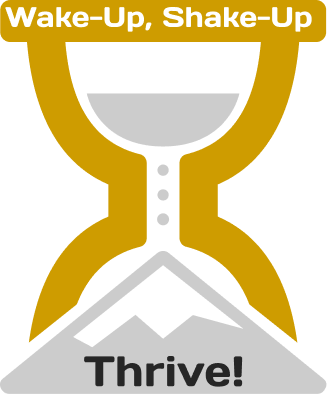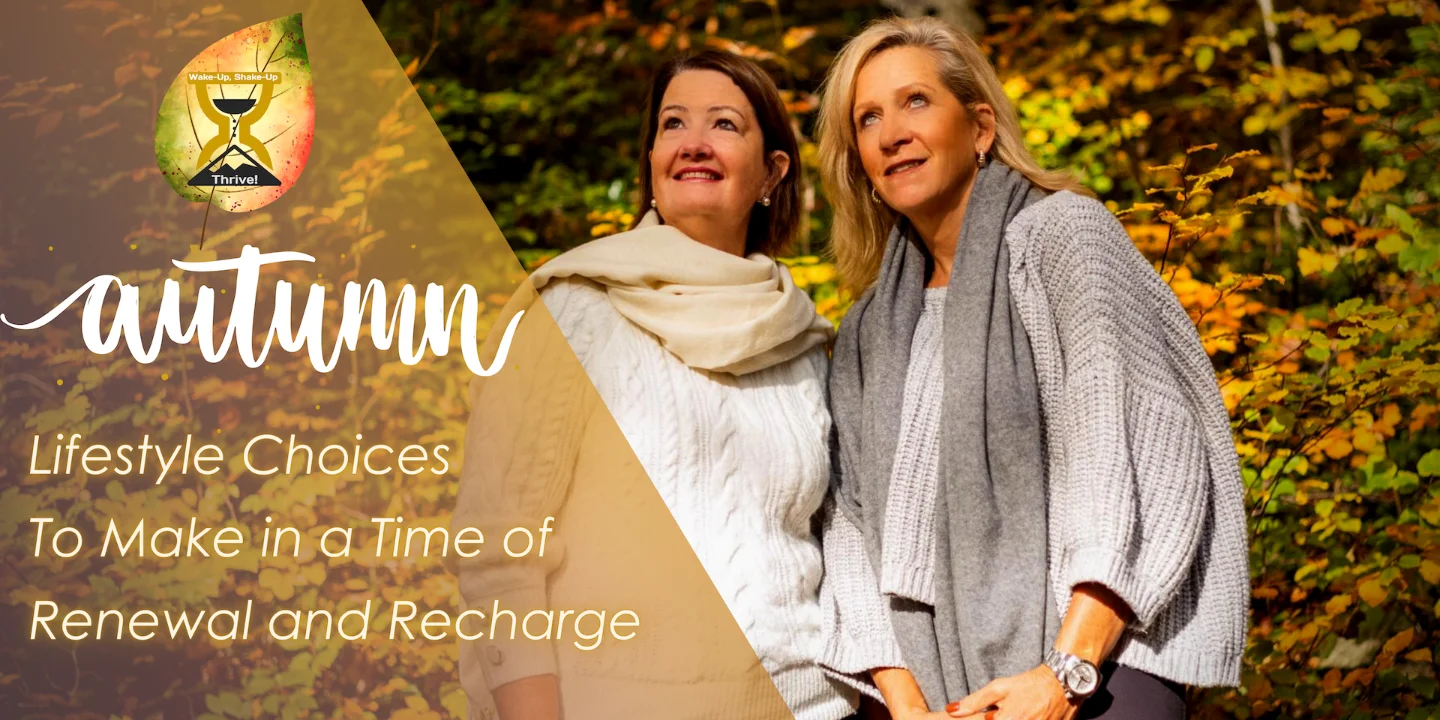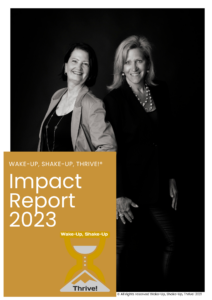What leaves will you be shedding?
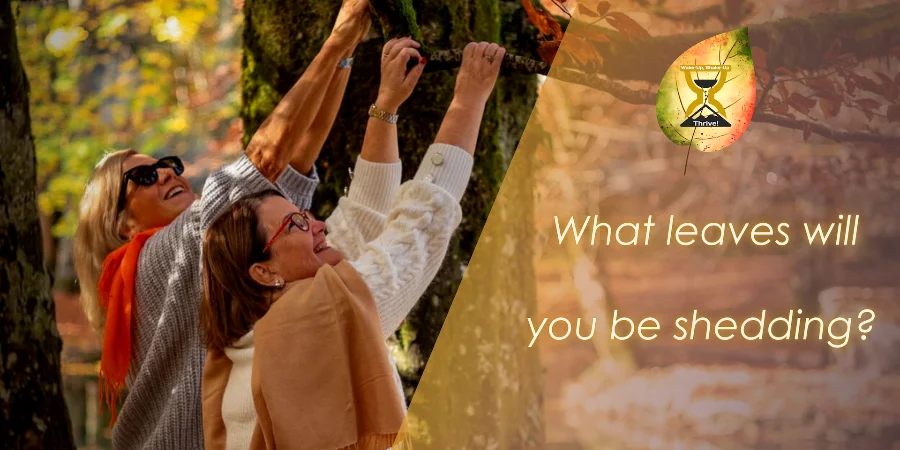
The current season may be called fall, but it’s anything but a letdown. Yes, the days will soon feel shorter, but right now, you’re busy. You’ve just finished harvesting and, at the same time, are already preparing to sow new seeds in the new year.
We’re amid the Autumn Equinox, a delicate balance where each day contains equal amounts of light and darkness. As we look at nature, we notice the trees are actively shedding their leaves – something they do to preserve their energy.
Autumn is a natural time to bring about change, shift your outlook, and recharge. Think of leaves like any of the negative habits and thoughts you’ve accumulated during the year. Fall is when you can actively let them drop so you can focus on what is truly important.
But what does any of this have to do with ageing? And, more precisely, ageing in a way that is more integrated, involved, and inspired?
Read on to find out how physical changes can lead to positive emotional outcomes and how subtle shifts now can improve our physical health forever. Our physical and emotional dimensions are in a mutually beneficial relationship – as long as we’re making conscious choices about adding more life into our years – not just adding more years onto our lives.
Lifestyle Choices and Our Physical Dimension
We have so much power with our conscious intentions. Studies show that lifestyle factors—including physical activity and cognitive engagement—can account for as much as 70% of the variance in age-related memory and mental changes.
We choose what we eat, whether and how we move, and how much sleep we get. There may be roadblocks to overcome if we have dietary restrictions or existing illnesses, but this does not negate our active role in these particular spheres.
What We Choose To Eat
In our book, Wake-Up Shake-Up Thrive! We discuss the advantages of a Mediterranean way of eating. Let’s not call it a diet because you’re not restricting yourself by eating whole grains, seafood, and healthy naturally occurring fats. There is worldwide consensus from researchers and physicians that eating this way helps prevent Alzheimer’s disease, high cholesterol, heart disease, and diabetes.
Consider the 2008 analysis of more than 1.5 million healthy adults who followed the Mediterranean way of eating. They showed significant health improvement and reduced cardiovascular and overall mortality risk.
The Mediterranean food pyramid is heavily weighted with antioxidants from fruits and vegetables — substances that may potentially mitigate and repair cell damage — a boon for heart health and overall health and even fewer cancer and Parkinson’s incidences.
Make the conscious choice that half of your plate should be fruits and vegetables, and you won’t notice what you’re missing. There’s undoubtedly a shift in perspective when you focus on what you’re putting on your plate and NOT what you’re leaving off.
The Food-Mood Connection
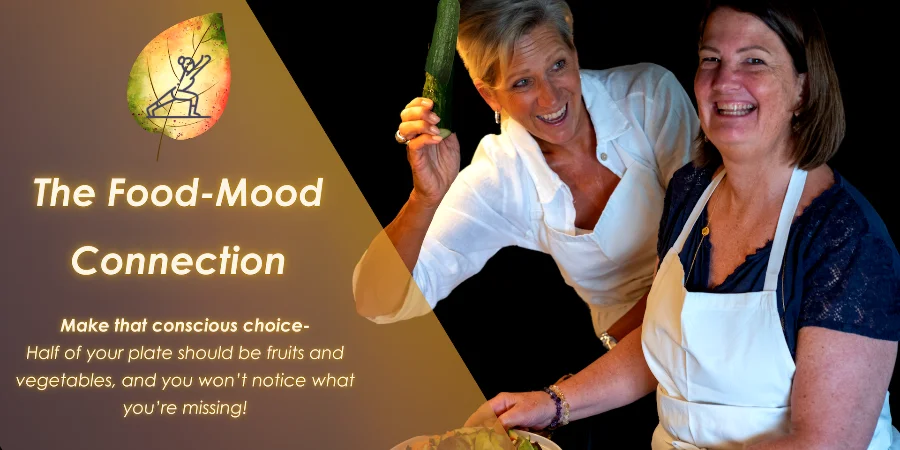
You’re feeding to fuel your brain and body, not just to comfort yourself or indulge. Emotionally, you’ll feel satiated and more even-keeled.
When you choose processed sugar-laden foods, the result is energy levels that peak and nosedive. You become irritable, seeking more sugar to counteract unstable blood sugar levels.
How We Choose to Move
As we share in our book, the exact physical activity we choose is not as important as just being physically active in the first place – and for as long as we can.
Whatever you want to keep doing, you must choose something that will light you up. Maybe you need emotional support and community. While one may enjoy the solitude of a hike, others may enjoy joining a tennis club and doubles.
The Move-Mood Connection
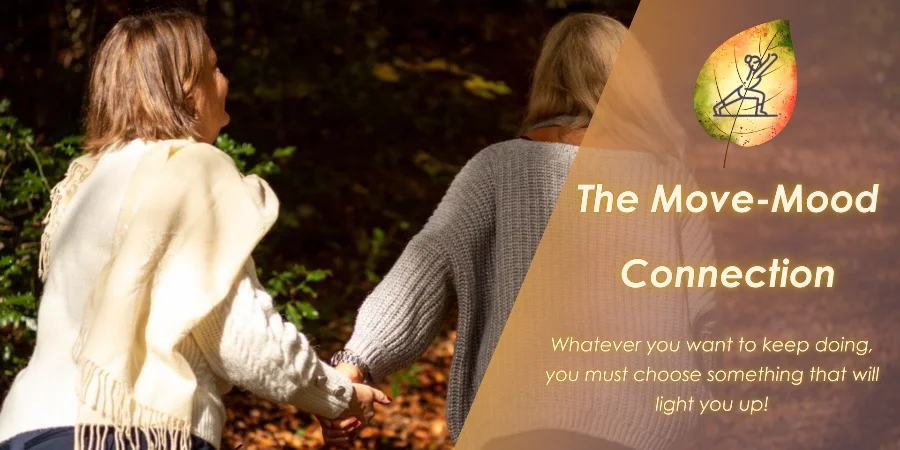
Engaging in physical activity benefits mobility, balance, flexibility, and sleep. If you’re not getting restful sleep, your mood is affected. If you’re anxious from not sleeping, you’re more agitated – making it even harder to get to sleep. Then it becomes a continuous cycle – unlike the cycle of the seasons – you need it to end.
How Much Sleep We Get
During this time of year, your long-to-do list might trick you into wanting to get more out of your day and stay up later. Don’t be fooled. You still need the same amount of sleep (7-9 hours) every night, so your mindset, routine and environment really matter.
For a proper gauge of what your body needs, check in on how much sleep would you enjoy if you never set your alarm. On your next weekend or vacation, give this a try! If you find yourself oversleeping, there is a good chance you have been depriving yourself of much-needed rest.
The Sleep-Mood Connection
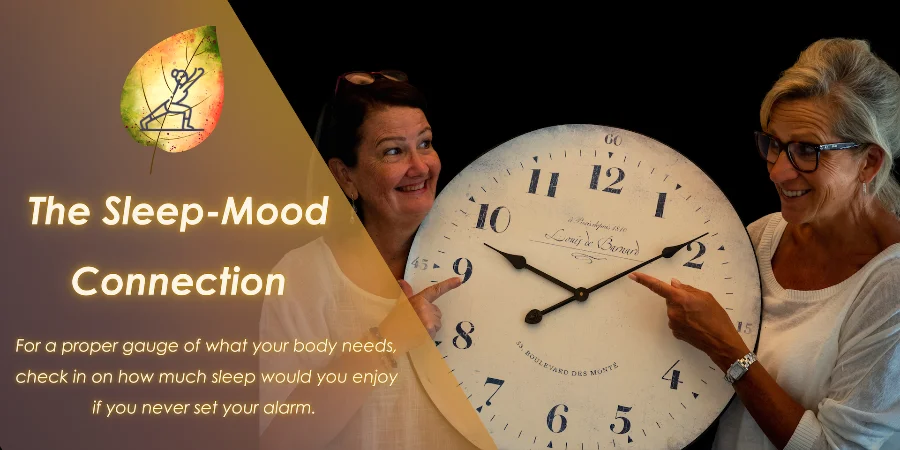
If you’re over 50, the challenging news is that your sleep is not as restful as it was in your late teens and twenties. You may have been able to burn the candle at both ends in your youth, but sleep in these later years is crucial for memory and attention, problem-solving, creativity and, most of all, mood. And just to add to the challenge, sleep also affects food choices and body movement!
Your Emotions About Ageing Are a Choice – Are You Choosing Your Personal Equinox?
Remember how we said that our physical choices have emotional outcomes? Well, our emotions are just as much within our control, and there are a few important caveats about emotions as we age.
Fall can be an emotional time. Seasonal Affective Disorder can feel very powerful since our bodies derive vitamins and mood from sunshine. Maybe the end of the year stress at work or impending time spent traveling or with family has left you feeling frazzled. But it’s important to remember that you ARE NOT your emotions. You are not frazzled or harried, or resentful. Instead, you are feeling frazzled or harried, or resentful. It’s not a state of being but a temporary emotional state you are experiencing and by viewing it from a state of feeling rather than being, you can take charge.
Do you know people over 50 who hold onto outdated views of ageing? They say things like, “Well, it’s all downhill after x age” or “My health is not what it used to be,” as though they are powerless to stop the hands of Father Time. Their minds may be made up – but yours is not. Your views about ageing WILL have a profound effect on how long you live and whether you will remain engaged, hopeful, and, dare we say, passionate.
How to find your Personal Equinox Now
Physical:
Starting now, track your physical well-being. Use an App, website, or hand-written journal to begin tracking your food, movement, and sleep. Observe your patterns and take advantage of data comparisons to assess where you are now. Remember, to manage any change successfully, you must start with know where you begin.
Emotional:
Starting now, commit to noticing how you feel. As you go about your day, notice when, where and how feelings pop up, then try to observe how those feelings make you act. Remember, emotions are felt through all of your senses – sight, sound, touch, taste and smell.
Passions are NOT just for your wistful youth.
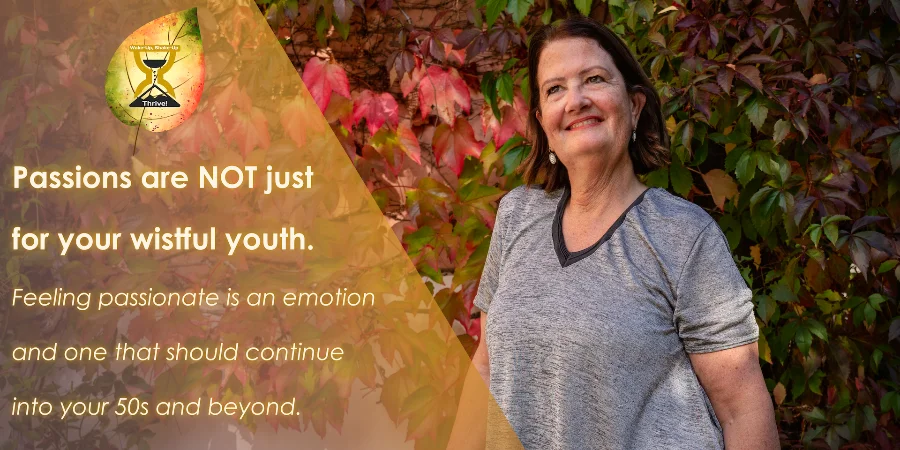
A study of 115 people published in the Annals of Behavioral Medicine found that participants’ moods were more positive when pursuing hobbies, and they had lower stress and heart rates. That’s a pretty good result just for doing something you enjoy. The study’s conclusion is? Leisure activities can improve a person’s health and well-being.
Feeling passionate is an emotion and one that should continue into your 50s, 60s, and beyond. You must choose something to dive deeper into and get curious about – it’s for your emotional health and also helps your physical health.
In our book, we talk about Total Brain Health, a global leader in educational wellness programs for professionals in active aging. Their cutting-edge science has proven that pursuing passions can be a buffer against memory loss and improved neuroplasticity – the ability of the brain to form and reorganize new connections.
Passion is when you find that match that sparks your fuel to get up and meet each day and its challenges because you’re building your dream life. You’re not waiting for someday because you know the time is NOW at this stage in life.
You’re meeting each day with the choices you make – so what are you planting NOW so you’ll continue to meet each day with curiosity and positivity?
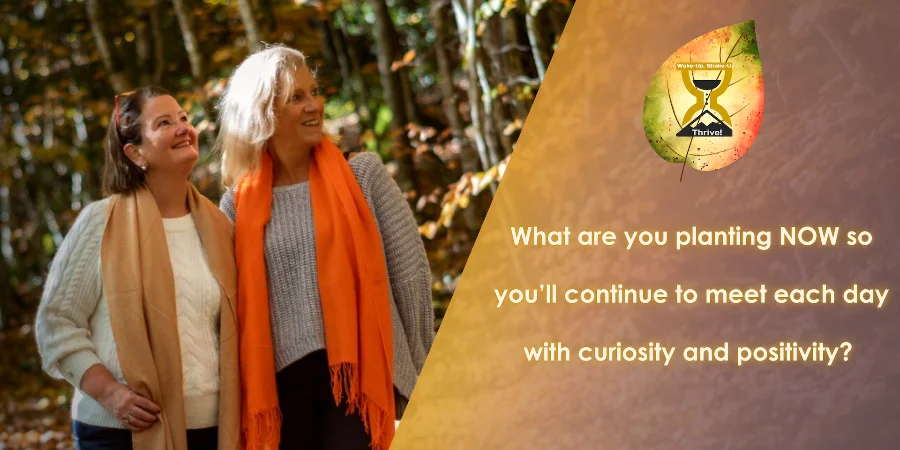
If you’re looking for guidance in these areas, we offer a 90-minute wake-up check-up coaching session with Dominique and Ellen to assess where you are and where you’re headed. You’ll discover insights and strategies to begin the New Year with a renewed sense of how the rest of your life might look!
